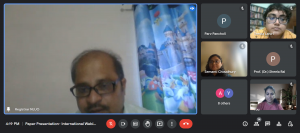
“Report on International Webinar on Sustainable Fishing: Politics, Economics and Science, 30 July 2022”
Report on International Webinar on Sustainable Fishing: Politics, Economics and Science
30 July 2022
Centre for International Trade Law, National Law University Odisha organised a multi-disciplinary international webinar on Sustainable Fishing: Politics, Economics and Science. There were two sessions- A panel discussion in the morning and paper presentations in the afternoon.
Participants in the panel discussion were:
Prof. (Dr.) Priyambada Mohanty Hejmadi (Padmashree and Former Vice Chancellor of Sambalpur University and NLUO), Mr Haneul Jung ( Lawyer and former Director of Trade Dispute Settlement Division, Ministry of Trade, Industry & Energy of the Republic of Korea), Dr Madhuri Ramesh (Assistant Professor, School of Development, Azim Premji University), Prof. (Dr.) Abhijit Das (Director, Center for WTO Studies, IIFT), Prof. (Dr Sheela Rai (Professor NLUO), Ms Eluckiaa A. (Assistant Professor NLUO), Mr Kapil Sharma (Faculty, NLUO).
The Webinar started with a welcome address by Prof. (Dr) Ved Kumari, Vice Chancellor NLUO. She highlighted the sustainability issue and the North-South divide in development issues. The Panel discussion was moderated by Prof. (Dr) Sheela Rai. The first panellist, Prof. (Dr) Priyambada Mohanty Hejmadi, discussed the US Shrimp case and her experience as an expert witness to the WTO in this case. She particularly highlighted the protection measures taken by Odisha for Olive Ridley Turtles.
Mr Hanuel Jung elaborated on the negotiating history of the Fisheries Subsidies Agreement. He highlighted why the developing countries were objecting to the Fisheries Subsidies Agreement and the fact that the Agreement imposed the same burdens on all countries despite the different fishing capacities of developing and developed countries. He also raised the concern that since the present Agreement was an interim arrangement, there was a possibility that a more comprehensive agreement may be finalised in future. Dr Madhuri Ramesh started her discussion with the question of whether economic regulations are suitable mechanisms for the governance of environmental issues. She discussed the adverse consequences of conservation measures and that such measures lack consultation with the community members. She highlighted the challenges faced by people with such conservation measures.
Prof. (Dr) Abhijit Das traced the origin of the Fisheries Subsidies Agreement from the Doha mandate. He gave a brief description of the three pillars of the FS Agreement. He discussed the possibility of forum shopping as the present Agreement borrowed from other Agreements and the FAO Plan of Action. He emphasised that the major problem in fishing conservation was industrial fishing practised by developed countries and the present Fishing Subsidies Agreement facilitates it instead of checking it. Prof. (Dr) Sheela Rai highlighted the difference between the Draft Agreement and the Final Fisheries Subsidies Agreement adopted by the 12th Ministerial Conference in 2022. She highlighted that the present Agreement integrates the fisheries conservation efforts outlined in other international Agreements, whereas the draft Agreement was objectionable as it was imposing new and additional obligations on the WTO members.
Ms Eluckiaa A. stated that concerns of small-scale and artisanal fisheries could be addressed only by strengthening the Special and Differential Treatment provisions in the Fisheries Subsidies Agreement. She envisaged a possibility of a contest of scientific methodology under the Fisheries Subsidies Agreement, just like there was a contest of turtle protection standards in the US Shrimp case. She also urged the need for interdisciplinary research to back the methodology and to drive the discussion on negotiating S&DT provisions in the FS Agreement. She stated that a provision in the Draft Agreement which was not included in the Final Agreement provided a de minimis level of 0.7%, whereas India stood at around 4.29 %. Thus, she urged that such a threshold should be challenged with scientific data, given the long coastline of India. Mr Kapil Sharma urged for the reform of dispute resolution provisions in the Fisheries Subsidies Agreement. He highlighted Canada's proposal in this regard and stated that remedies under the Dispute Settlement Understanding and the implementation provisions like determination of the level of suspension of concessions might not be effective under the Fisheries Subsidies Agreement given the sustainability objective of the Agreement.
The Panel Discussion was followed by the paper presentations in the afternoon session. Two NLUO alumni, Ms Semanti Choudhary (Manager-Delivery DWF Mindcrest) ( and Ms Teesta Lahiri (Senior Researcher, IIFT) chaired the session. Four research papers- A Critical Analysis on the Role and Impact of Reforms in Fisheries Subsidies by Ananya Sharma, Analysing the Viability of India's Proposal During Negotiation of Fisheries Subsidies Agreement by Shaivi Nihal Shah, Fisheries Subsidies Agreement: Demystifying the Overcapacity and Overfishing Conundrum by Yashvardhan Singh and IUU Fishing: Subsidy Issue v Law Enforcement Issue by ArchitChakravorty were presented. This was followed by a valedictory address given by Prof.(Dr.) Yogesh Pratap Singh. He highlighted the need to preserve marine resources and that WTO as a trade institution should play an active role in this. He highlighted India's position in the Fisheries Subsidies Agreement Negotiation and briefly commented on the pending Indian Marine Fisheries Bill of 2021. The Webinar ended with a Vote of Thanks by Prof. (Dr.) Sheela Rai. She thanked all the panellists, chairs and paper presenters for an intellectually stimulating discussion. She thanked the Vice-Chancellor, Registrar, and the CITL Members for the Webinar's success.









